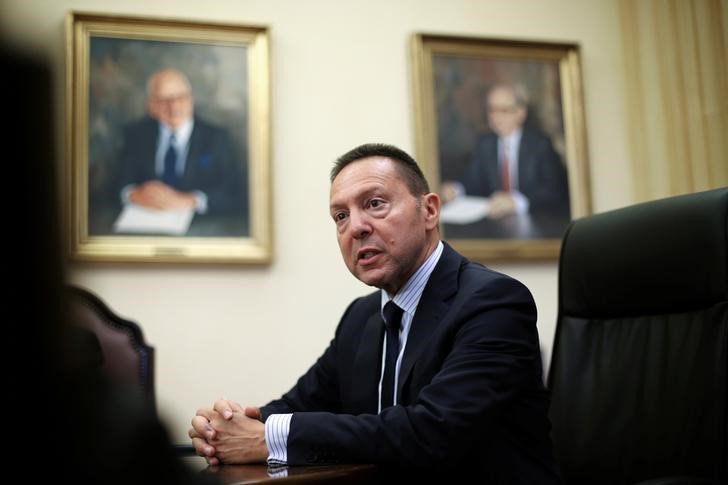 © Reuters. Governor of the Central Bank of Greece Stournaras speaks during an interview with Reuters at the bank’s headquarters in Athens
© Reuters. Governor of the Central Bank of Greece Stournaras speaks during an interview with Reuters at the bank’s headquarters in AthensATHENS (Reuters) – Greece will need a financial “safety net” after its bailout ends in August and should consider a precautionary support program, the central bank governor said on Monday.
Greece has received 260 billion euros in financial aid since 2010, and its third bailout expires in August. Athens is eager to show it can stand on its own feet in accessing new money and this month raised 3 billion euros from a seven-year bond issue.
But some European Union policymakers believe Greece cannot go it alone without a standby line of credit.
Yannis Stournaras, speaking at an annual meeting of the central bank’s shareholders, said a precautionary support program would help Greece’s funding process.
“International experience has shown that a test foray into the markets to create a safety net of liquidity before the end of the program creates a climate of confidence and paves the way for the country to exit the program,” Stournaras said.
“However, a precautionary support program should be considered additionally,” Stournaras added. It would reduce Greece’s borrowing costs and would give the government and the banks access to credit after the bailout ends, he said.
The government is keen to avoid such a precautionary credit line as it would likely come with conditions attached, a difficult pill to swallow after eight years of austerity.
“The possibility of using a preventative support program… should not be dramatized, Stournaras said, “as European mechanisms were created to be used if there is need”.
Fusion Media or anyone involved with Fusion Media will not accept any liability for loss or damage as a result of reliance on the information including data, quotes, charts and buy/sell signals contained within this website. Please be fully informed regarding the risks and costs associated with trading the financial markets, it is one of the riskiest investment forms possible.
Source: Investing.com





























